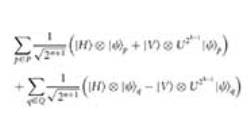Feb 25 2013
An international research group led by scientists from the University of Bristol, UK, and the University of Queensland, Australia, has demonstrated a quantum algorithm that performs a true calculation for the first time. Quantum algorithms could one day enable the design of new materials, pharmaceuticals or clean energy devices.
 Image of calculations from the paper
Image of calculations from the paper
The team implemented the ‘phase estimation algorithm’ — a central quantum algorithm which achieves an exponential speedup over all classical algorithms. It lies at the heart of quantum computing and is a key sub-routine of many other important quantum algorithms, such as Shor’s factoring algorithm and quantum simulations.
Dr Xiao-Qi Zhou, who led the project, said: “Before our experiment, there had been several demonstrations of quantum algorithms, however, none of them implemented the quantum algorithm without knowing the answer in advance. This is because in the previous demonstrations the quantum circuits were simplified to make it more experimentally feasible. However, this simplification of circuits required knowledge of the answer in advance. Unlike previous demonstrations, we built a full quantum circuit to implement the phase estimation algorithm without any simplification. We don’t need to know the answer in advance and it is the first time the answer is truly calculated by a quantum circuit with a quantum algorithm.”
Professor Jeremy O’Brien, director of the Centre for Quantum Photonics at the University of Bristol said: “Implementing a full quantum algorithm without knowing the answer in advance is an important step towards practical quantum computing. It paves the way for important applications, including quantum simulations and quantum metrology in the near term, and factoring in the long term.”
The research is published in Nature Photonics.
Paper
'Calculating unknown eigenvalues with a quantum algorithm' by Xiao-Qi Zhou, Pruet Kalasuwan, Timothy C. Ralph and Jeremy L. O’Brien in Nature Photonics